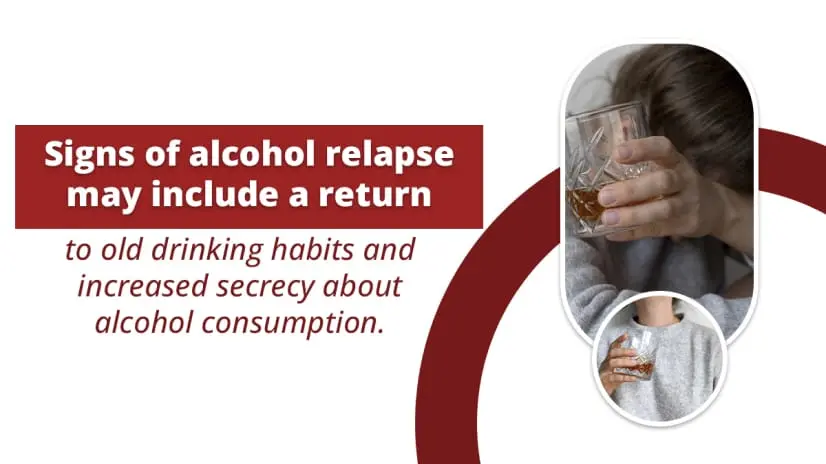
Common Warning Signs Of Drug Or Alcohol Relapse
Clinically Reviewed by:
Relapse, a return to substance use after a period of abstinence, is a complex aspect of addiction. It may feel like your loved one is simply not trying to recover, but that is not the case. Addiction is not a lack of willpower but a challenging condition influenced by various factors.
This article aims to provide families with valuable insights into relapse, its warning signs, high-risk situations, and strategies to support loved ones.

Key Takeaways
With millions of Americans touched by addiction, it is important to learn how to recognize the signs of a relapse. Here’s what you need to know:
- Relapse is when an individual resumes substance use after abstaining from addiction for a certain period.
- Certain signs and symptoms suggest when a person is about to relapse into addiction.
- Effective strategies and methods should be adopted when a loved one relapses.
Call Indiana Center for Recovery at (844) 650-0064 to speak to an admissions counselor and reserve your place in treatment.
Understanding Relapse
The relapse of a loved one can be challenging, but it is important to provide support. When someone faces addiction, relapse refers to a return to substance use after a period of abstinence.
It’s essential to recognize that addiction is a complex and often recurring chronic condition. Relapse doesn’t signify a lack of willpower or moral failure but rather highlights the difficulty of overcoming substance dependence.
Educating oneself about the triggers and stressors that may lead to a relapse helps in creating a supportive environment for your loved one. Open communication and a non-judgmental attitude are key components in assisting a loved one through recovery challenges.
Early Warning Signs of Relapse
Recognizing the early warning signs of relapse is crucial for individuals in the recovery process to prevent a return to their drug of choice. It’s important to note that relapse signs may vary from person to person, but some common indicators include:
- Social Withdrawal: Avoidance of friends, family, or support groups, social isolation, and withdrawal from activities.
- Changes in Mood and Behavior: Increased irritability, anxiety, depression, mood swings, and sudden changes in behavior.
- Poor Stress Management: Difficulty coping with stressful situations without turning to alcohol and inability to manage life’s challenges without resorting to old coping mechanisms.
- Neglect of Self-Care: Disregarding personal hygiene and appearance and neglecting healthy habits such as exercise and nutrition.
- Denial and Rationalization: Minimization of the severity of past addiction-related issues and rationalization of reasons to use in moderation.
- Reconnecting with Old Environment: Spending time in places where drugs or alcohol are easily accessible and reconnecting with friends or acquaintances who encourage using.
- Neglecting Support Systems: Failure to attend support group meetings or therapy sessions and disconnection from the recovery support network.
- Thoughts of Relapse: Frequent thoughts about drinking or romanticizing past experiences of drug use and fantasizing about controlled or moderate use.
- Changes in Sleep Patterns: Insomnia, irregular sleep patterns, and increased reliance on substances to induce sleep.
- Physical Symptoms: Presence of physical signs like shaky hands, sweating, or increased heart rate, and poor coordination and impaired motor skills.
- Lack of Accountability: Avoidance of taking responsibility for actions or decisions and blaming external factors for personal challenges.
- Financial Issues: Unexplained financial difficulties or uncontrolled spending on drugs or alcohol and neglecting financial responsibilities.
Individuals in the early days of recovery need to be self-aware and honest with themselves about any emerging signs and distinct stages of relapse. A person in recovery must seek professional help and maintain a strong support system.
High-Risk Situations Leading to Relapse
Relapse is a common concern for individuals recovering from addiction, and certain high-risk situations can increase the likelihood of returning to substance use. Identifying and addressing these situations is important to maintain a long-term recovery plan. Here are some high-risk situations that may lead to relapse:
Social Pressure
Being in social situations where substances are readily available or where peer pressure is present can be risky and lead to the pitfall of social drinking; practicing assertiveness and learning to say no are vital skills to navigate these challenges.
Celebrations and Holidays
Events that involve parties, celebrations, or holiday gatherings may be associated with substance use; planning, having strategies in place, and communicating boundaries can help individuals navigate these occasions safely.
Boredom
A lack of meaningful activities and boredom can contribute to relapse; engaging in hobbies, pursuing interests, and setting goals can provide a sense of purpose and fulfillment, reducing the risk of succumbing to substance use.
Relationship Issues
Conflicts, breakups, or strained relationships can increase stress; developing healthy communication skills, seeking relationship counseling, and fostering emotional resilience are crucial in managing these challenges.
Overconfidence
Feeling overly confident in one’s ability to resist substances may lead to complacency; continued self-awareness, attending support groups, and ongoing personal growth efforts are crucial to maintaining a humble and vigilant mindset in recovery.
Isolation
Withdrawal from social connections and support systems can increase the risk of relapse; maintaining regular contact with supportive friends, family, or recovery groups and actively seeking social engagement are essential for sustained recovery.
Physical Illness or Pain
Chronic pain or other health issues may lead individuals to seek relief through substances. Exploring alternative pain management strategies, open communication with healthcare providers about past addictions, and holistic approaches to health are important aspects of recovery.
Environmental Triggers
Places, smells, or situations associated with past substance use can evoke cravings; identifying and avoiding such triggers or developing coping mechanisms for them, such as cognitive-behavioral techniques, are crucial in preventing relapse.
Financial Problems
Financial stress can be a significant trigger for relapse; developing budgeting skills, seeking financial counseling, and addressing the root causes of financial issues are important steps to mitigate this risk and maintain stability in recovery.
Complacency
Once an individual has been sober for an extended period, complacency can set in. Remain vigilant, attend support meetings, and continue personal growth efforts to avoid a relapse due to complacency. Recovery is an ongoing journey that requires sustained commitment and effort.
Psychological Symptoms of Relapse
Recognizing the mental health symptoms of relapse is crucial for individuals in recovery and their mental health. Here are some common psychological symptoms associated with relapse:
Cravings
Intense and persistent urges to drink or use drugs can be a significant indicator of impending relapse. Stress, emotional needs, or exposure to addiction-related cues may trigger these cravings. Actively managing these triggers is essential for individuals to maintain their commitment to sobriety.
Negative Emotions
Feelings of anxiety, depression, frustration, anger, or loneliness can contribute to vulnerability to relapse. Some individuals may turn to drugs or alcohol as a way to cope with these emotions, making it essential to address and manage them effectively.
Denial and Rationalization
People on the verge of relapse may engage in cognitive distortions, such as minimizing the consequences of drinking or convincing themselves that they can control their drug use.
Nostalgia For The High
Individuals in recovery may sometimes romanticize or idealize the positive experiences associated with drinking or taking drugs while forgetting the negative consequences. This distorted perception can contribute to relapse.
Impaired Decision-Making
Drugs and alcohol affect cognitive function, and individuals on the verge of relapse may experience impaired judgment and decision-making. It can lead to making choices that increase the likelihood of relapse.
Individuals in recovery, as well as their friends, family, and support networks, should be vigilant about these psychological symptoms and address them promptly to prevent relapse.
Understanding the Disease Model of Addiction and Relapse
The Disease Model of Addiction posits that substance abuse disorders are chronic, relapsing conditions rooted in neurological and genetic factors. According to this model, addiction is considered a brain disease characterized by altered brain structure, leading to compulsive drug-seeking behavior.
It emphasizes that individuals are not solely responsible for their addiction but rather face a complex interplay of biological, psychological, and environmental factors. Relapse, a common challenge in recovery, is viewed as a symptom of the chronic nature of addiction rather than a moral failure.
Dealing With The Relapse of a Loved One
The first step towards understanding the concept of relapse in a loved one involves recognizing the challenges and complexities associated with recovery from addiction. Here are some key aspects to consider:
Recognizing Triggers
Help your loved one identify situations, emotions, or stressors that may lead to relapse. Considering triggers is the best thing for developing coping strategies and avoiding situations of higher risk. Encourage open communication to foster self-awareness and a proactive approach to managing these triggers for a more resilient recovery journey.
Building a Support System
Encourage your loved one to establish a strong support network. Having reliable friends, family, or support groups can provide the emotional reinforcement needed during challenging times. Additionally, educating oneself about signs of relapse helps provide empathetic and informed support.
Developing Coping Skills
Work together on cultivating healthy coping mechanisms, such as mindfulness, exercise, or creative outlets. These skills can replace the need for the use of addictive substances as a way to deal with stress or negative emotions. Collaborate on creating a personalized toolkit for coping strategies that align with their preferences and needs.
Creating a Relapse Prevention Plan
Collaborate on crafting a personalized plan outlining steps to take when facing potential relapse. A clear strategy can empower your loved one to make healthier choices in challenging moments. Regularly revisit and adjust the plan, ensuring its relevance to their evolving recovery journey.
Learning from Setbacks
Emphasize that setbacks do not equate to failure. Encourage your loved one to view relapses as opportunities for learning and growth, identifying triggers and refining their relapse prevention plan accordingly. Remind them that the journey to recovery is a process, and each step forward, no matter how small, is a significant achievement.
Encouraging Professional Help
Suggest seeking professional guidance, such as counseling or therapy, to address underlying mental health issues contributing to their addiction. Professional support can provide valuable insights and coping strategies, helping your loved one navigate the root causes of their addiction and fostering a more comprehensive approach to recovery.
Fostering a Positive Environment
Help create a positive and nurturing environment that promotes sobriety. Encourage activities and relationships that align with a healthier lifestyle, reinforcing the importance of positive influences. Cultivating a supportive atmosphere can significantly contribute to your loved one’s motivation and commitment to maintaining their recovery.
Frequently Asked Questions (FAQ)
Recognizing a relapse involves vigilance for subtle signs like increased cravings, mood swings, sleep disturbances, isolation, and declining self-care. Physical symptoms may include fatigue, nausea, or tremors. Emotional red flags include heightened stress, irritability, and anxiety. If experiencing these signs, seeking prompt support from a healthcare professional is crucial for intervention.
Alcohol relapse can strain relationships, causing erratic behavior and emotional turmoil. Individuals may become distant, lie, or neglect responsibilities. Trust may be eroded, leading to strained communication and emotional distress for friends and family. Seeking open dialogue and professional support can aid in rebuilding connections and fostering understanding.
Support your loved one by expressing concern without judgment. Encourage open communication and active listening. Suggest professional help, such as counseling or support groups. Establish boundaries to protect yourself while maintaining empathy. Offer consistent emotional support and stay involved in their recovery journey.






 100% Confidential
100% Confidential